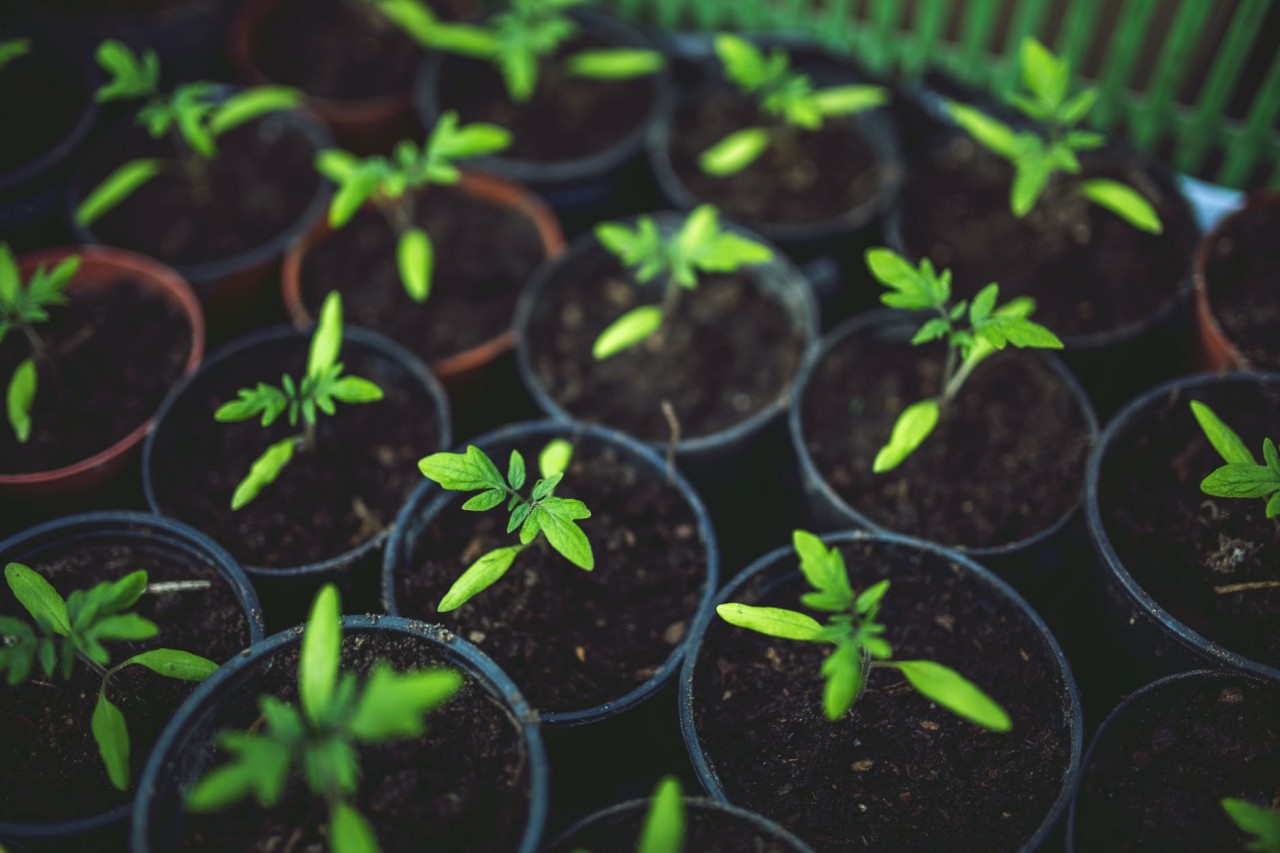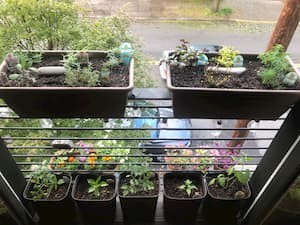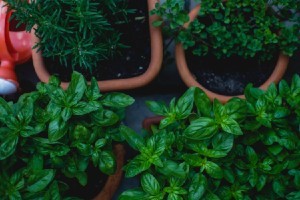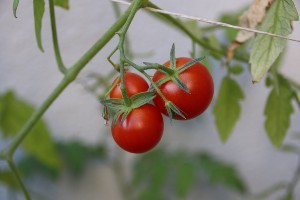Green Blog
It's the Perfect Time to Try Container Gardening
Soil + Plants + Container = Container Gardening!
Have you always wanted to grow your own food but lack the space? Maybe unwilling to commit the time and resources required in traditional gardening. The good news is there is a simpler way to grow food at home, and no back yard required! A balcony or porch, a small patch of sunny asphalt or even a windowsill can offer the means to container gardening. It's a great way to grow food, give kids a hands-on science lesson or even to cure boredom.
What is a Container Garden?
Container gardening is just what it sounds like- growing plants in a relatively small, enclosed, portable object rather than directly in the ground. We are all familiar with growing flowers in a pot, but you may not have considered that the same is possible with vegetables, fruits and herbs.
Why a Container Garden?
Container gardens not only alleviate space concerns, they are also often easier for gardeners with limited mobility to access, are a good alternative to planting in poor soil, virtually eliminate weeds, are a convenient way to protect your plants from wildlife, and can require less resources and labor than traditional gardens. Additionally, you can create the perfect conditions for your garden by being able to move it around.
What to Plant
The most practical things to grow in a container garden are vegetables, fruits, and herbs that you and your family can eat. Potatoes, chard, lettuce, Asian greens, strawberries, cucumbers, chili and bell peppers, eggplants, summer squash and pole beans are all commonly grown in container gardens, with salad cress and tomatoes often considered the easiest things to grow and able to flourish in something as simple as a yogurt tub. Common herbs in container gardens include basil, coriander, mint, thyme, parsley, rosemary, lemongrass and dill. Just about anything that doesn't have a large, spreading root system can grow in a container. Melons, pumpkins, and squash are typically not ideal in this situation.
Selecting a Container
Generally, bigger containers are better as they can store more water. However, smaller containers can still work if your space or resources are limited. You will probably want to move your garden at least occasionally, so choose something you can lift or otherwise move. You can buy traditional gardening containers such as glazed ceramic or terracotta pots, but you can also re-purpose things you might already have around your house or that you could cheaply thrift or take off of someone's hands for free. Successful gardens have been made in barrels, buckets, laundry baskets, bathtubs, or in wooden and cement containers. You can also put a practical container inside of a more attractive one to match the aesthetic of your home. Avoid metals and dark colored plastics as they can get hot enough to heat up the soil and kill plant roots. Your container will need at least one large hole or several small holes at the bottom to allow for drainage; otherwise the soil will become too soggy and your plants won't thrive.
Whichever container you choose, make sure there is adequate space for the plants' roots, otherwise their growth will be stunted. Also keep in mind that larger containers can retain more moisture and need to be watered less often. Below are the minimum soil depths for some commonly grown vegetables and herbs, as well as some ideas for good and bad companions in the same container, according to Gardener's Supply Company.
| Plant Type | Minimum Soil Depth |
| Chives, lettuce, radishes, other salad greens, basil, coriander | 4-5" |
| Bush beans, garlic, kohlrabi, onions, Asian greens, peas, mint, thyme | 6-7" |
| Pole beans, carrots, chard, cucumber, eggplant, fennel, leeks, peppers, spinach, parsley, rosemary | 8-9" |
| beets, broccoli, okra, potatoes, sweet corn, summer squash, dill, lemongrass | 10-12" |
Good Companion Plants:
- Beans, carrots, squash
- Eggplant, beans
- Tomatoes, basil, onions
- Lettuce, herbs
- Spinach, chard, onions
Combinations to Avoid:
- Beans with onions and garlic
- Carrots with dill or fennel
- Tomatoes or squash with potatoes
- Onions with beans and peas
Filling the Container
Soil from your lawn is not the best option for a container garden as it will compact and not drain properly and it likely contains seeds that will grow into weeds. Invest in organic potting soil for the best results. Mix in an organic fertilizer, or compost if you have it. People often put about an inch of rocks or gravel at the bottom of a pot to improve drainage if there aren't adequate holes in the container. You can start your plants from seeds or purchase seedlings from a nursery. It is generally considered easier to start with seedlings, as seeds can be delicate.
Selecting a Location
Most vegetables need about six hours of sunlight per day, and herbs and salad greens can tolerate getting a bit less. Check a potential location every 30 minutes throughout the day to make sure it receives sufficient sunlight. You could even put your containers on a movable cart so they can be given more sun throughout the day or season. Also consider how much protection from wind your plants will require and use the sides of buildings or other structures to prevent them being battered by the wind and place larger plants so that they shield smaller, more delicate ones. This is of particular concern with plants that need to be trellised. Lastly, ensure that your plants are out of reach from animals such as deer or rabbits.
Caring for your Garden
In the summer, you will need to water your container at least once, possibly twice, a day. Keep the soil moist, but not wet. When the top inch of soil is dry to the touch it is time to water again. Add mulch around the plant to help it retain water. You can also put your container inside of another, larger container and fill the space between the two with moss or newspaper. If you wet this material at each watering, it will help the soil hold moisture. You will need to add some sort of trellis to support climbing plants.
Many local nurseries are still open and preparing for spring planting. Check out one of the options below to get the seeds, seedlings, soil, and other materials needed to get your garden going!
Accepting online orders for curbside pickup.
http://www.shortysgardencenter.com/
10006 SE Mill Plain Blvd, Vancouver
360.892.7880
Open and asking all guests to follow CDC social distancing guidelines.
http://www.hayesfamilygrowers.com/
3004 NE 182nd Ave, Vancouver
360.513.5354
Orders for pick up accepted.
https://yardngardenland.com/
1501 NE 102nd St, Vancouver
360.573.7172
Open and asking all guests to follow CDC social distancing guidelines.
http://cascadegreenhouse.net/directions.html
6005 NE 139th St, Vancouver
360.892.9494
Open and asking all guests to follow CDC social distancing guidelines.
http://www.chapmansgreenhouseandnursery.com/
14002 NE 117th Ave, Vancouver
360.892.1405
Open and asking all guests to follow CDC social distancing guidelines. Offers curbside pickup and delivery.
http://www.tsugawanursery.com/
410 E Scott Ave, Woodland
360.225.8750





